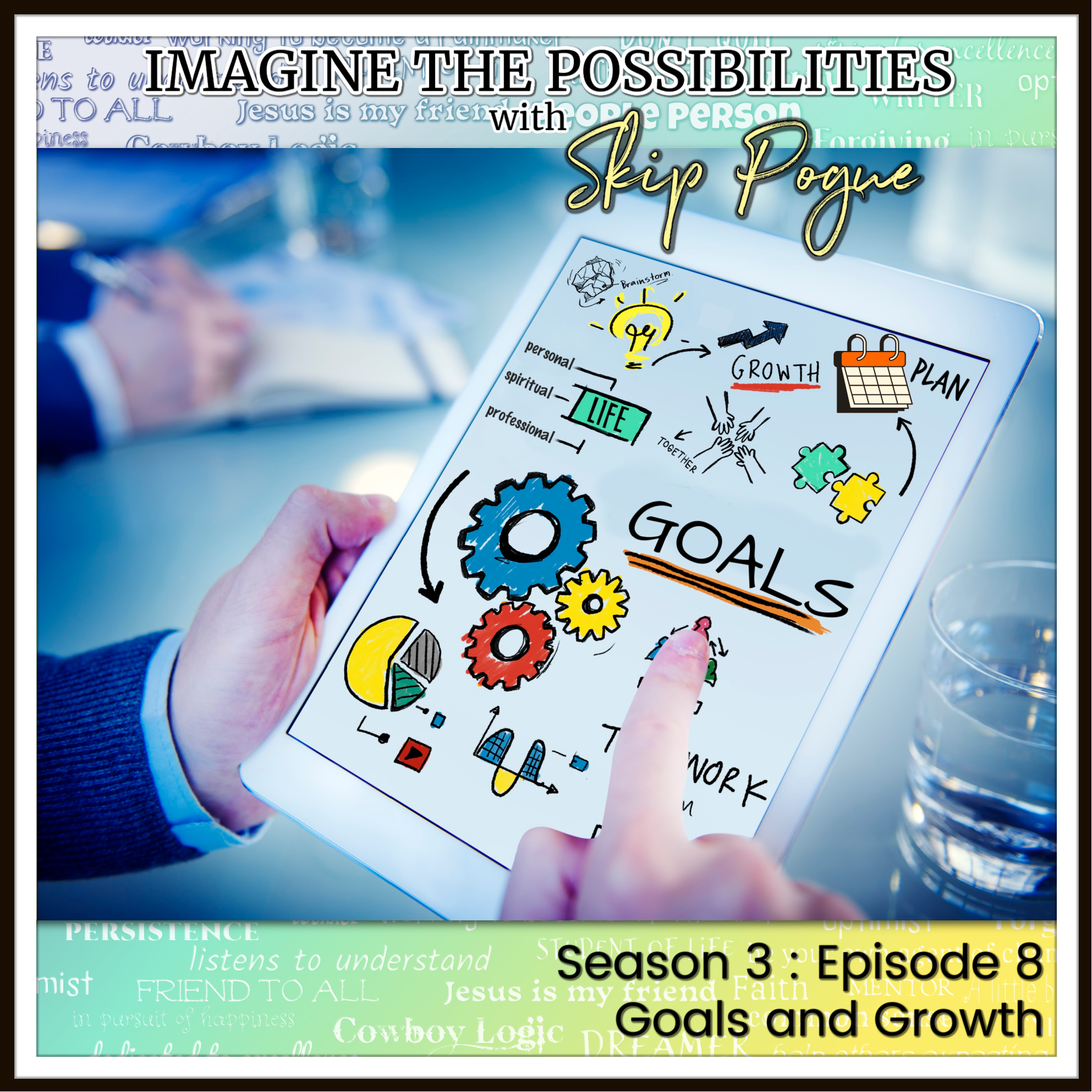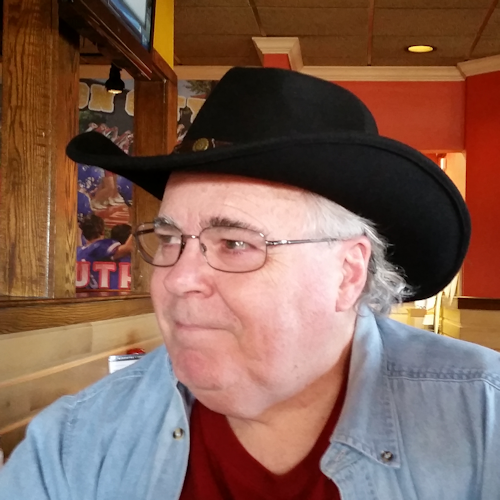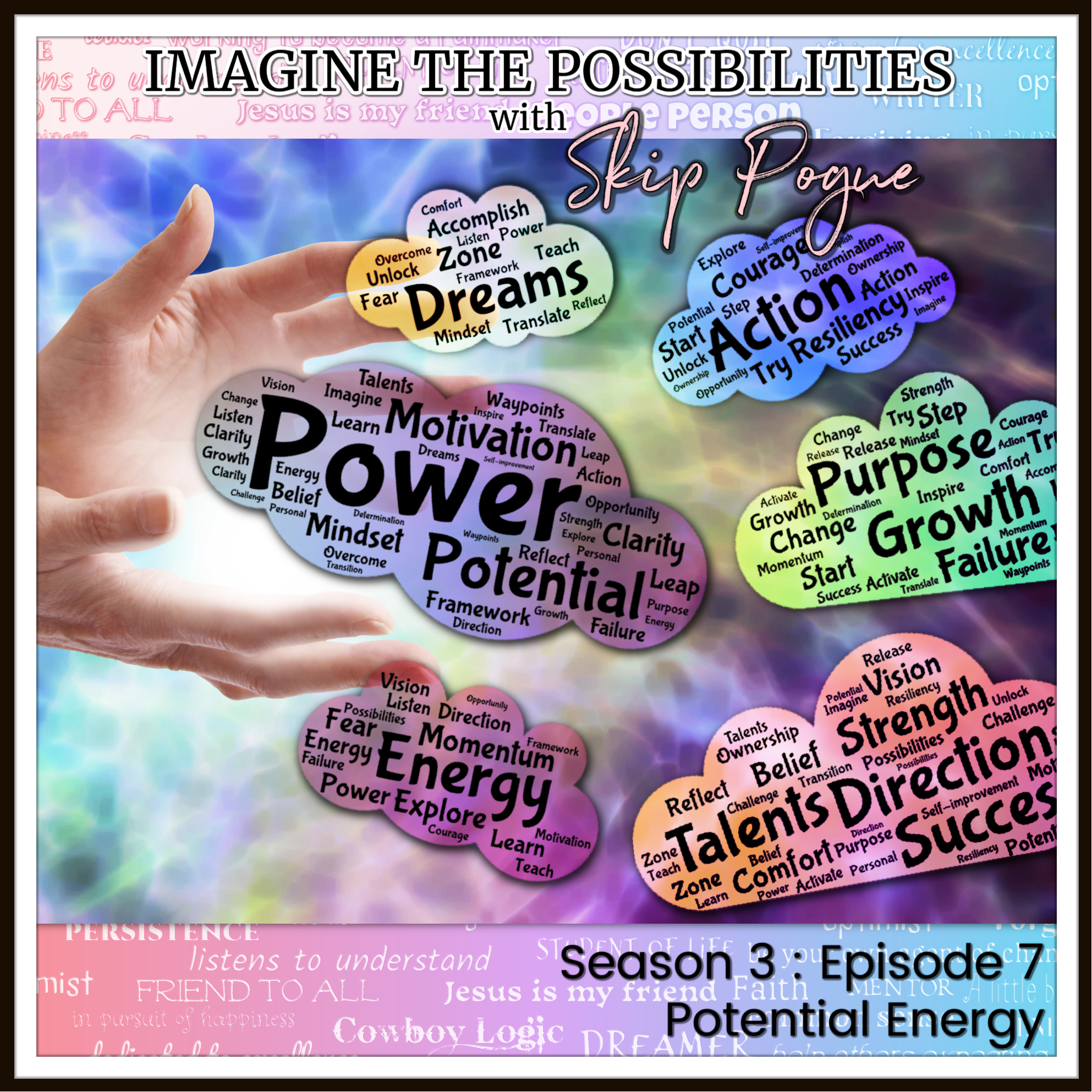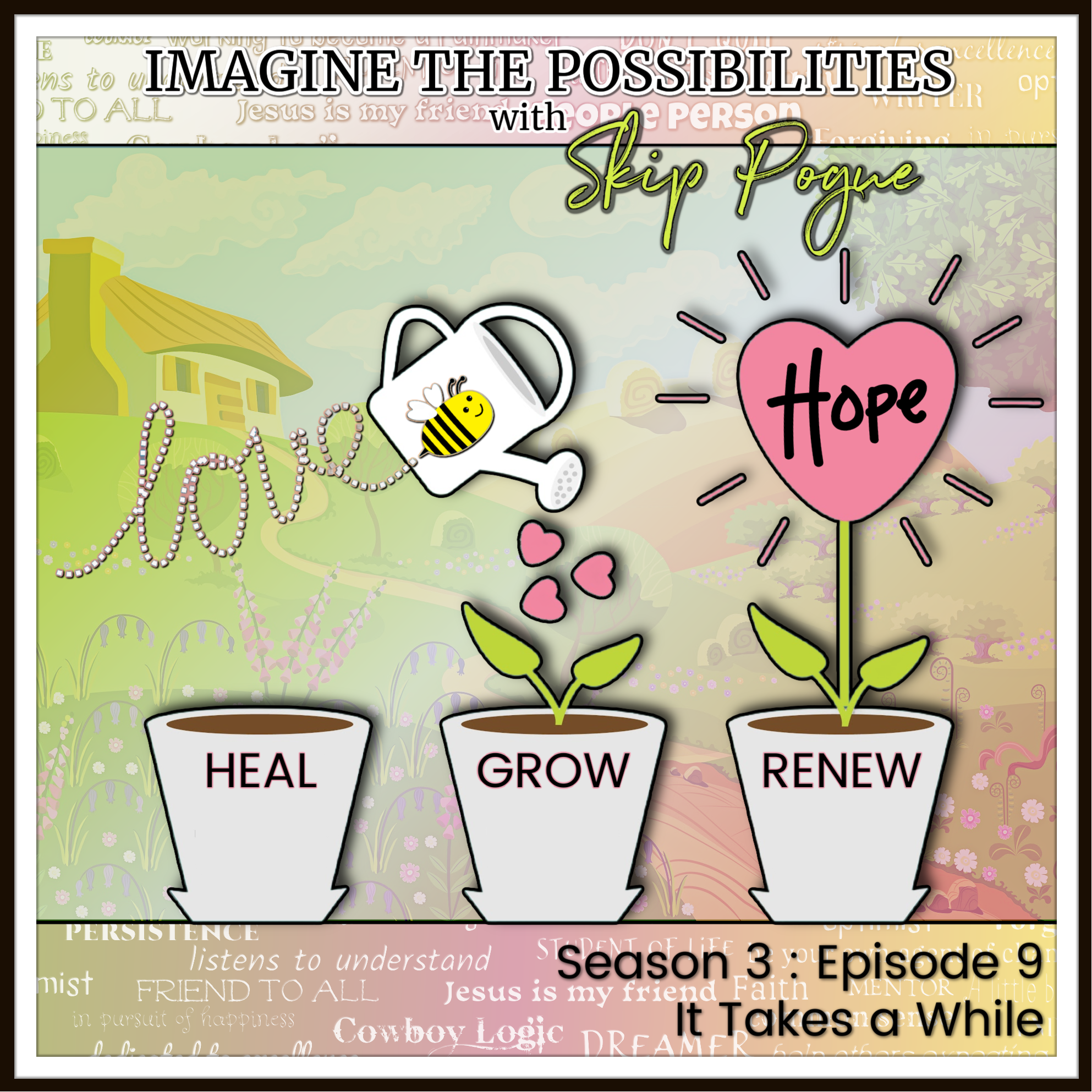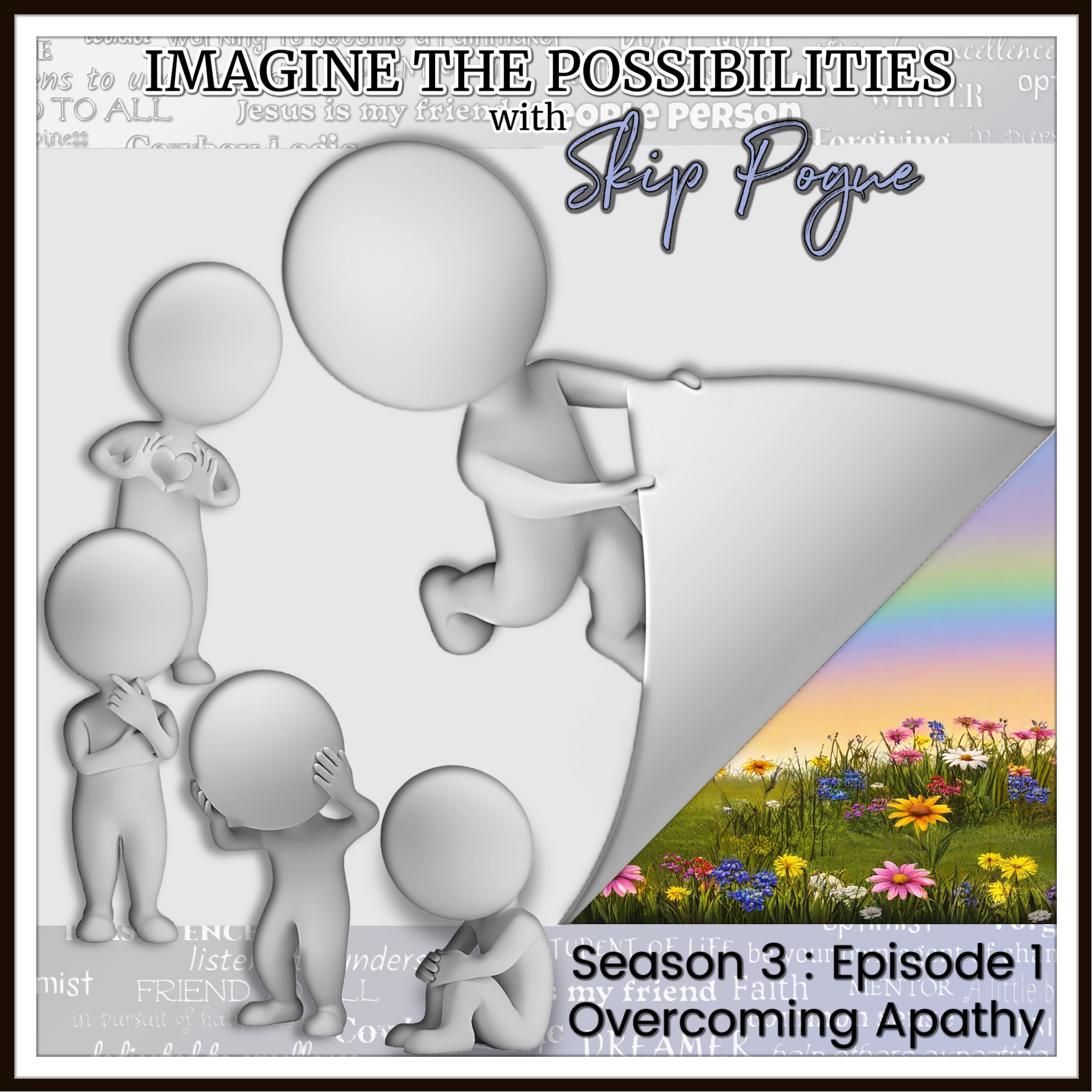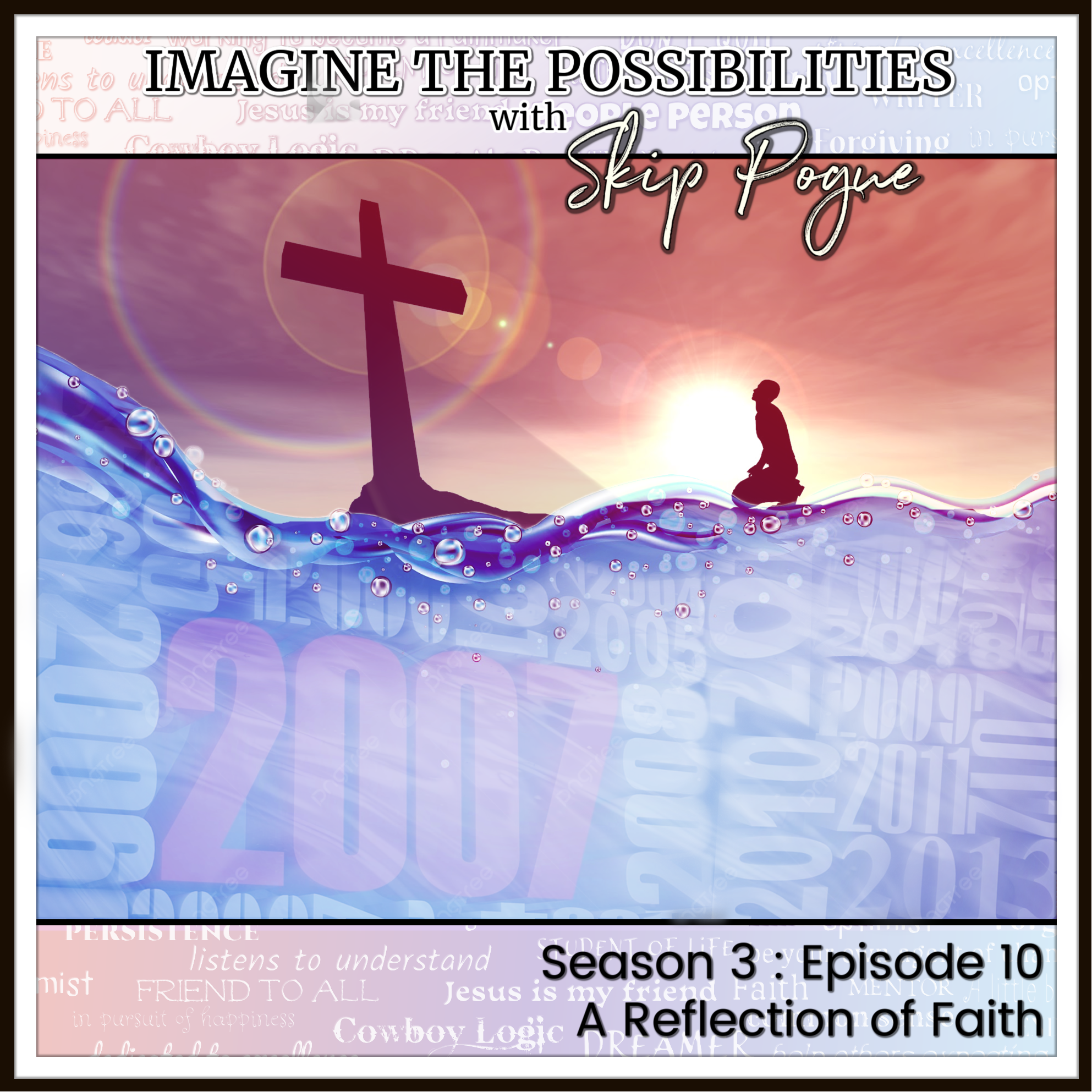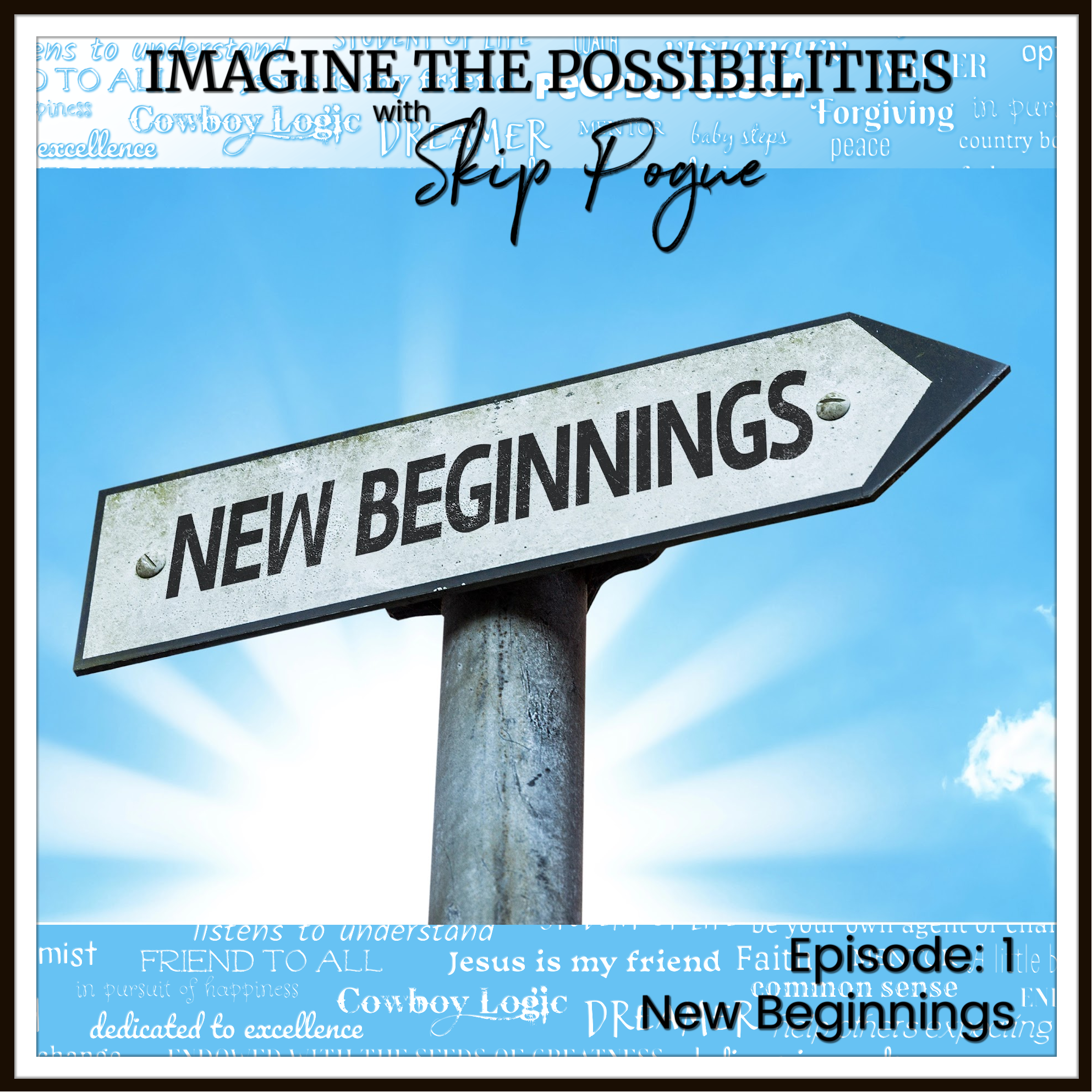In this episode, we're going to take a closer look at how goals and growth work hand in hand, in our personal, professional, and spiritual lives. I'll share a few stories — including one about my iPAQ, my horse, and even how Imagine the Possibilities began — to show how setting goals gives us direction and growth gives us momentum. Together, they help shape our journey toward lasting success. So, let’s talk about the map, the journey, and how both can lead to incredible growth in our lives.
View Full Transcript
Episode Transcript
[00:00:12] Hello, my name's Skip Pogue, and I'd like to welcome you to Imagine the Possibilities.
[00:00:18] The other day I went back to listen to a podcast and I just picked one randomly, and it happened to be one from season two.
[00:00:26] It was titled Success is a Journey, Not a Destination.
[00:00:31] And after I listened to it, it dawned on me that there was a question there. And that question was, if success is a journey, where does it start?
[00:00:43] How does it begin?
[00:00:45] In thinking about it, I realized it begins with goals.
[00:00:50] And I also realized that once we've set a goal, what moves us forward?
[00:00:57] And I realized that was growth.
[00:00:59] And from that came this podcast.
[00:01:03] I realized too, that goals and growth apply to our personal life, our professional life, and our spiritual life.
[00:01:12] I thought about it and I believe that goals are the map and growth is the journey.
[00:01:20] Why are goals important?
[00:01:23] I believe they're important because goals give us direction. If we don't set goals, we just kind of drift around.
[00:01:33] Kind of like if you were in a boat in the middle of a lake and you didn't have any paddles and the wind's blowing, we just kind of drift around willy nilly.
[00:01:43] On the other hand, goals provide clarity and focus.
[00:01:48] Let me tell you a little story. I was a manager at the time, and I had an ipac. I don't know if you know what an IPAC is, but I guess the easiest way to describe it would be a smartphone without the ability to make phone calls.
[00:02:03] And in that IPAC was a line.
[00:02:06] That was a goal for me. And the goal was I wanted to be a director of the company I worked for. I wanted a promotion to director. I felt like I knew what they did. I felt like I had the skill set now to accomplish that and that it was time.
[00:02:26] So one day I look up and my director is walking through my door, along with the vice president of the company and the president of the company.
[00:02:37] Now, I didn't know why they were there, and at first I was a little nervous because I tried to think back real quick. Did I do something wrong?
[00:02:46] Why would they be here?
[00:02:48] I must have done something wrong, but I can't think of what it would be.
[00:02:52] It didn't take them but a few minutes to put my mind at ease. And they told me that I had received a promotion to director and that they knew I could do a good job and all that. So I was sitting my desk, kind of letting that all soak in and everything, and I picked up my IPAC and I started typing in it. And Joe, the vice president, walked Over. And he said, what are you doing?
[00:03:19] And I said, I'm changing my goal. I said, my current goal is or was to become a director. And I held up, showed it to him, and I said, I completed that goal. I. I need to set a new goal.
[00:03:33] And he said, well, what's your new goal going to be? And I said, I typed it in, and I showed him the phone. I said, I want your job. I want to be the vice president.
[00:03:44] And he kind of laughed and he said, well, that's good, because I want Bob's job. Bob was the president. He said, I want Bob's job. And Bob laughed and he said, well, that's good, because I want to retire.
[00:03:53] So I felt like three of us set a new goal.
[00:03:57] The vice president to become president and the president to retire.
[00:04:02] Here's the thing you have to remember.
[00:04:04] You're never too old or too young to set a goal.
[00:04:10] There's no age limit on it.
[00:04:14] I'll give you an example of a young goal.
[00:04:17] At 16, my dad bought me a horse.
[00:04:22] Now, I hadn't asked for a horse.
[00:04:25] I knew nothing about horses. But my dad bought me one, and we stabled it in a barn just down from our house. There was probably a half a dozen or more horses stabled in that barn anyway. It didn't take me but about 3Ns to realize two things.
[00:04:45] I realized I had no idea how to ride a horse.
[00:04:49] And the second was I had no idea how to care for a horse.
[00:04:53] The first thing I needed to do, or at least in my mind I needed to do, was figure out how to get riding lessons. And I found a place that gave riding lessons, signed up for them. The second thing I needed to do was learn what I needed to do for the horse.
[00:05:11] And since there was other horses stabled there, I went down and there was a couple people feeding and watering the horse. And I showed them my horse. It was really pretty. It was a dark black gilding, had been shoed and everything. So there was none of that kind of things that needed to be done. So I started asking them, what do I need to do? How do I take care of horse?
[00:05:34] They kind of, at least one of them, they both told me what I needed to do. But one of them kind of took me under his wing and he started showing me stuff I needed to do.
[00:05:44] So over a relatively short period of time, I acquired two new skills. One of them was horseback riding, and the other one was taking care of the horse. I learned the necessity of water, feed, brushing, cleaning, out the stall and everything else. So I had all these new things to do.
[00:06:04] Because I was a horse owner.
[00:06:07] I didn't understand for a while why my dad bought the horse.
[00:06:13] And then I guess it was later on. It was after I was in college. I sold the horse before I went to college. I wanted to make sure it got a good owner and everything, so I sold it.
[00:06:24] But I realized later on that the reason my dad bought me the horse was he had a goal in mind.
[00:06:34] And that goal was to make sure I understood what responsibility was.
[00:06:41] And I have to say, having a horse taught me a whole new level of responsibility.
[00:06:48] It was different than I had a dog, and it was so different than the dog, because the dog was easy to take care of and it was in the house. I didn't have to travel. It didn't matter if it was, you know, raining outside, snowing, wind blowing or whatever. I didn't have to do anything but get its water bowl and feed bowl. And it was housebroken. Let it out. But mom and dad could let it out.
[00:07:16] So was it. I guess it was a responsibility, but it was nothing like the horse. So, anyway, I learned riding. I learned to take care of the horse. And I think the whole point my dad doing that was teach me responsibility.
[00:07:28] And I did learn responsibility when it comes to older or too old.
[00:07:35] When I was 74 years old and I had several people, had a lot of people actually encourage me to start a podcast, and I set a goal to start a podcast. I didn't know anything about podcasting. I didn't know what you needed, how you did it, anything else.
[00:07:56] But I had been watching Graham Wardle. Graham Wardle was one of the stars on Heartland, and he had left the show and he wanted to start a podcast. He did start a podcast, and I started following. It was titled Time Has Come in, watching Graham on the show and then listening to his podcast.
[00:08:16] He's a very enlightening person and a very encouraging person, and the group we had that followed him was also enlightening and encouraging.
[00:08:29] So I started listening, paying attention to what was said and the encouragement everybody was giving. And then one day, I didn't tell anybody what I was going to do, but I told them I was working on a project.
[00:08:43] And several people wrote me back and said, well, that's good.
[00:08:48] What are you going to do? What's this project entail? And I said, well, I don't really want to tell you what the project is, but it does require that I'm going to have to announce it.
[00:08:59] And a couple people said, well, it must be a pretty big deal if it requires an announcement. And I said, yeah.
[00:09:06] And I said, I'll tell you what, I will announce it to this group of people. We had a reading club on Time has Come. So it was in the reading club that I told them that. And I told him, I said, I'll announce it to this group first.
[00:09:22] So when I got done with everything and was ready to go live, we had a call scheduled, a Zoom call. And when we got on the Zoom call, I told them I'd do it before July 1st.
[00:09:35] And when we got on Zoom Call, everybody pointed out it was just a couple days, July 1st. And I said, that's okay.
[00:09:43] I said, let me tell you what I'm doing. So I told him, I said, I've been doing this work. I said, I've learned all the things that I need to do, or at least I think I have.
[00:09:54] And I said, I'm going to announce my podcast right now. And I told him the name of it was Imagine the Possibilities. And everybody congratulated me and all that. And it was really cool. I really enjoyed it and I was enthusiastic about it.
[00:10:10] I had already recorded my first podcast, so when I put it out for everybody to listen to, I had quite a few people listen to the first one, which was really exciting, and I felt encouraged by that.
[00:10:26] I guess what the point I'm trying to make is that setting goals is a lifelong process.
[00:10:38] When we achieve a goal, we need to go back and set a new goal.
[00:10:44] If we don't do that, we. We just quit growing.
[00:10:49] Now when we set a goal, we generally want to set a big goal, a long term goal, because that gives us a vision of where we want to go.
[00:11:00] But the thing is, we've got to break that long term goal, that big goal down into smaller steps, because the smaller steps help create progress.
[00:11:11] And one of the cool things now is our smartphones. There's apps available for our smartphones that allow us to track things like they allow us to track a big goal that we've broken down into smaller steps. And maybe it's not each little item as much as it's doing something every day.
[00:11:33] I have seven goals in my smartphone right now. And each day I try to do something toward each of those. Now most days I make it with the top four. The other ones, I may not get around to it that day, but I will the next day. But anyway, I keep track of them so I know what I'm doing, how, how much effort I'M making and whether I'm getting closer and closer to repeating or fulfilling that goal.
[00:12:08] Our goals can be.
[00:12:10] Our big goals can be about anything. They can be about fitness, about learning new things, or a new thing.
[00:12:17] About our professional life, our spiritual life are about our personal life. They can be virtually about anything that we feel like we want to accomplish moving forward.
[00:12:31] There's a thing about goals.
[00:12:34] Goals need to have some level of flexibility, because as we work toward that goal, we may realize that there's more small things we needed to do and we need to adjust our goal. Or it may be that we wrote a goal down and realized that to really complete that goal, it needs to be modified in some way so there's a level of flexibility.
[00:13:03] The thing is that when we adjust that goal, we have to realize it's not a failure because we had to make the adjustment.
[00:13:13] The adjustment is part of the growth that we experience.
[00:13:18] It's kind of like my vice president goal.
[00:13:22] It was really more about growth than it was about the title. The growth was in new skills, leadership, maturity, and all that stuff. If the only reason you're setting a goal like that to become vice president is because you want VP in front or behind your name, then in my mind, the goal's not worth it. Because if all you want is the title, for me anyway, the goal would be very shallow.
[00:13:50] So set your goals. Set goals that you want to obtain, and especially goals that will help you grow in whatever it is. Personal, spiritual, professional. Set goals that will help you do that.
[00:14:05] We talk about growth.
[00:14:08] Growth's the fuel of the journey.
[00:14:11] Goals give us direction, and growth provides the momentum.
[00:14:17] Growth equals learning, adapting, and becoming stronger.
[00:14:24] I think we've got to remember that our greatest growth most often occurs when we're faced with challenges.
[00:14:33] There was a year that I traveled 40 weeks. I was gone from home 40 weeks.
[00:14:41] Some weekends I got to come home.
[00:14:44] Other times I got to come home every other week.
[00:14:49] And then the 12 weeks that were left, I took four weeks of vacation at the end of the year. Well deserved, I think.
[00:14:57] And the other eight weeks, I was gone one or more days in those weeks. So I spent a tremendous amount of time away from my family, away from my kids, away from my friends.
[00:15:10] And that was an issue.
[00:15:13] But the thing that came out of that was I realized that I missed a bunch of family moments. But I also realized that I gained a new perspective on my priorities, on how to balance my personal and professional life, and most importantly, on what truly mattered to me.
[00:15:37] I guess part of the lesson in that was growth oftentimes happens in the struggle we didn't want, but maybe desperately needed.
[00:15:49] But I did learn a lot from that. I learned a lot about myself, too.
[00:15:54] Practical steps for growth. I think the first one is to stay curious.
[00:16:00] Read, listen, learn.
[00:16:03] You probably know, if you listen to other podcasts, how I feel about reading. And I think reading is really important.
[00:16:10] And of those seven goals I talked about, reading is one of them. Now, I don't expect to read a book in the next hour, but I do expect sometime today. I'm going to sit down with a book I've got a bookmark in, and I'm going to read.
[00:16:28] I may read five pages or I may read five chapters, but I'm going to read in that book. I'm going to read that book and I'm going to move forward in the goal of reading that book.
[00:16:39] It's just that simple.
[00:16:42] I think journaling is important.
[00:16:45] Write down your goal and then write the things you've learned from it. You check the little box off or whatever, but write down. If there's something that really impacts your growth, write it down in your journal.
[00:17:01] Here's something that's really important.
[00:17:03] Surround yourself with positive people that will encourage you and challenge you.
[00:17:12] Don't find yourself caught in a trap of negativity.
[00:17:17] Once you start down that path, sometimes it's really hard to get back into a positive mindset. So surround yourself with people. Encourage you, positive people. And if you find yourself with negative people, try to move away as quick as you can. Now, I'm not saying you can't have negative friends, but just don't let them input or imprint stuff on your mind that makes you believe that you can't accomplish anything. Because I say this often and I truly believe it.
[00:17:54] I don't believe there's a person that can't accomplish remarkable things in their life.
[00:18:01] Now, I'm not saying everybody's got to be president or everybody's got to be, you know, find the next great thing or anything, but I do think you can accomplish things that are truly remarkable.
[00:18:13] I just believe that a big one when it comes to growing is our comfort zone.
[00:18:23] To grow, we've got to step out of our comfort zone.
[00:18:27] And I guess the play on words would be. And that's uncomfortable, and it truly is.
[00:18:34] Growth hardly ever happens when things are easy.
[00:18:38] And that's why we've got to get out of our comfort zone. We've got to stretch. We've got to work where we can grow.
[00:18:47] You can do it.
[00:18:48] You can Step out of your comfort zone and you can really grow.
[00:18:53] I guess if you ask me what the takeaway from this whole thing is, I would tell you that it's setting goals is a lifelong process.
[00:19:05] It's something you need to do for your entire lifetime. It's not, oh, when I'm 20, when I graduate college, when I go to work, when I do this, when I do that. You need to set goals and you need to set goals in your personal life.
[00:19:20] My 40 week thing is a good example of not having good goals in my personal life. You need to set goals in your professional life, whatever that may be, and you need to set goals in your spiritual life.
[00:19:35] As a Christian, I can tell you I have a personal relationship with God.
[00:19:43] Now, I'm not preaching. I'm not one of those people that is going to be up in your face over religion, but I do think it's important.
[00:19:55] I think the takeaway from this podcast is that setting goals is a lifelong process.
[00:20:03] Each time that we set a goal and we complete that goal, we need to set another one to keep moving forward.
[00:20:11] Goals are the map. Growth is the journey, and together they make success possible in a personal, professional and spiritual life.
[00:20:21] What's your next goal?
[00:20:23] What are you doing to grow toward that goal?
[00:20:28] My closing message to you would be to set goals.
[00:20:32] Use growth to reach your goals, and when you reach those goals, set new goals.
[00:20:40] Setting and completing goals fuels growth.
[00:20:45] Setting goals is for a lifetime. The same thing applies to growth.
[00:20:50] Never quit growing.
[00:20:54] If you enjoyed this episode and you know somebody you think it would help, I'd appreciate it if you'd share it with them.
[00:21:02] Thanks for listening.
[00:21:05] I really appreciate the fact that you were willing to take some time out of your day to listen to this podcast.
[00:21:11] If you've got comments or you'd like to be notified when the next podcast becomes available, just go over to my Substack account and subscribe to it. The ID is at symbol ITPLife.
[00:21:29] In addition, all my podcasts are available on Substack.
[00:21:34] Remember that your future belongs to you. Stay humble, be kind, love unconditionally, and laugh often.
[00:21:42] Oh, and the big one. Enjoy life to the fullest.
[00:21:46] I hope that you have a super day and I pray that God blesses you in a super way.
[00:21:55] Thanks again and God bless.
[00:21:58] Sam.
